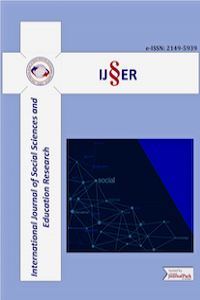Designing a relational database to alleviate the impacts of foreign words on the Turkish Language
The impacts of recent advances in technology on Turkish language have been seen obviously in the fields of computer, electric and electronics. Additionally, latest developments in information and communication technologies with the appearance of the Internet have affected Turkish in the areas of commerce, education and entertainment. As the rapid advancements in ICTs are usually discovered by developed countries, those reveal the need for new words in Turkish. The spread of the foreign originated terms impair the tradition of the Turkish language and its image. For instance, the simplest negative impact of foreign words can be seen on the Turkish vowel harmony. Since the use of the foreign originated words in Turkish language impairs both the Turkish spelling and utterance, the use of the equivalence of the foreign terms has been perceived as an important solution. Despite of this solution, it is not possible for Turkish speakers and writers to analyse the origins of the words that they select. In particular, the publications such as journals, papers, reports are evident in this case. Therefore, to alleviate the negative impacts of foreign words, a relational database design is essential. Upon the execution of this design, the origin of the words and their equivalences in papers, journals and reports can be identified with ease by Turkish’s speakers and its writers and those words can be swapped with their equivalences in Turkish language to alleviate the impact of foreign languages on Turkish prior to the press of journals and reports.
Keywords:
Impacts of foreign words, Turkish Language, relational database, terms,
___
- Akalın, Ş. H. (2003). Türkçe’nin teknik terim zenginliği. Teknik Bir Dil Olarak Türkçe Çalışma Grubu Toplantısı. İstanbul: Harbiye Kültür Sitesi.
- Arslan, M. (2012). A Historical Perspective on Teaching and Learning of Turkish as a Foreign Language. Kahramanmaraş Sütçü İmam Üniversitesi Sosyal Bilimler Dergisi , 9(2), 167-188.
- Aydoğan, B. (2001). Türkçeye Giren Yabancı Sözcükler ve Otel Adları. Türk Dili, 596, 144-154.
- Başçetinlik, A. (2009). Dilde Kirlenme. Çukurova Üniversitesi Türkoloji Araştırmaları Merkezi.
- Homan, J. V., & Kovacs, P. J. (2009). A comparison of the relational database model and the associative database model. Issues in Information Systems, 10(1), 208-213.
- İnayet, A. (2008). Turkish Studies International Periodical For the Languages. Literature and History of Turkish or Turkic(1), 294.
- Locke, J. L. (1988). Where did all the gossip go? Casual conversation in the Information Age. American Speech Language Hearing Association, 40(3), 26-31.
- Memmedova, N. (2009). The influences and the results of these influences of non-relative languages to each othe. Millî Folklor, 21(83), 121-127.
- Ören, T. (2005). Bilişimde Özenli Türkçenin Önemi. Bilgisayar Bilimleri ve Mühendisliği Dergisi, 1(1).
- Özkan, F., & Musa, B. (2004). Yabancı Dillerin Türkçenin Söz Dizimi Üzerindeki Etkileri. Türk Dünyası Sosyal Bilimler Dergisi(30), 95-139.
- Özsoy, S., Balcı, A., & Turan, Ü. D. (2012). Genel Dilbilim - I. Eskişehir: Anadolu Üniversitesi.
- Sapir, E. (1921). Language: An Introduction to the Study of Speech. New York: Harcourt, Brace.
- Sarı, M. (2008). Türkçenin Batı Dilleriyle İlişkisi. Ankara: TDK yayınları.
- Slobin, D. I., & Zimmer, K. (1986). Introduction. In D. I. Slobin, & K. Zimmer (Eds.), Studies in Turkish Language (pp. 1-). Amsterdam/Philadelphia: John Benjamins Publishing Company.
- Sumathi, S., & Esakkirajan, S. (2007). Fundamentals of relational database management systems. Warsaw: Springer.
- Tekten, T. (2009). Türk Dilindeki Yabancı Kelimelerin Türkçe Öğretimine Etkileri. 1st International Symposium on Sustainable Development. Sarajevo, Bosnia and Herzegovina.
- Temur, T., & Vuruş, N. (2009). An Analysis About The Use Of Turkish On The Internet Environment. Balıkesir Üniversitesi Sosyal Bilimler Enstitüsü Dergisi, 12(22), 232-244.
- Yaman, H., & Erdoğan, Y. (2007). İnternet Kullanımının Türkçeye Etkileri: Nitel Bir Araştırma. Journal of Language and Linguistic Studies, 3(2), 237-249.
- Yiğit, M. S., & Karaduman, A. (2011). Eğitim Fakültesi Öğretmen Adaylarının Bilgisayar Terimlerini Türkçe Olarak Kullanmaya İlişkin Görüşleri. International Journal of Social and Economic Sciences, 1(1), 15-23.
- Yunusoğlu, M. K. (2006). Türkiye Türkçesi Bilgisayar Metaforları. Modern Türklük Araştırmaları Dergisi, 3(2), 51-60.
- Yayın Aralığı: Yılda 4 Sayı
- Başlangıç: 2015
- Yayıncı: Mahmut DEMİR
Sayıdaki Diğer Makaleler
Adnan Veysel ERTEMEL, Ahmet BAŞÇI
Sinema filmlerinde gözetim ve iktidar ilişkilerinin inşası
Antik insanın sosyokültürel yaşamını yansıtan bazı diş ve iskelet sistemi anomalileri
Mehmet Burak TAŞTI, Ümmühan AVCI YÜCEL, Serpil YALÇINALP
9. ve 10. sınıf öğrencilerinin yabancı bir dil olarak İngilizceye yönelik metaforik algıları
Dede Korkut hikâyelerinin liderlik özellikleri üzerine bir araştırma
